- Home
- Roger Zelazny
Madwand (Illustrated) Page 12
Madwand (Illustrated) Read online
Page 12
The rooms and corridors through which he passed bore the dust of disuse in heavy layers, a thing he found mildly heartening when he moved through a series which could only be torture chambers—equipped as they were with chains, racks, tongs, pincers, weights, flails, whips, mallets and a great variety of oddly shaped blades. All of these bore stains, rust marks or both, along with the comforting coatings of dust. There were bones in odd corners, all of them gnawed long ago by rodents, now dry, brittle, cracked and discolored. Pol brushed a wall with his fingertips and heard the echoes of screams from long ago. When he switched to the second vision, he caught near-subliminal glimpses of atrocities enacted in times gone by, the traumas of which had etched themselves into the setting. Hastily, he reverted to the normal mode of seeing.
“Who . . . ” he whispered, more to himself, “was responsible for these things?”
The present lord, Ryle Merson, came the reply from ahead.
“He must be a monster!”
Once, such things were routine here. But he ceased all such activities nearly a quarter of a century ago, claiming that he had repented. It is said that he has led a relatively blameless, possibly even virtuous life since.
“Is it true?”
Who can say what lies in a persons heart? Perhaps he cannot even say himself, for certain.
“You are making this all totally enigmatic to me. I confess to being prejudiced, but in no way can I see his treatment of me as virtuous or blameless—and that goes for his lackey, Larick, as well.”
People have reasons for things that they do. Motives and objectives are seldom of matching moral color.
“And what of yourself, whatever you are?”
We are neither moral nor immoral now, for our actions contain no element of choice.
“Yet something set you upon the course you follow. There was a decision there.”
So it would seem—a touch of irony to these words?
“Still not giving anything away, are you?”
Nothing.
They moved past a fetid-smelling cistern in which something was splashing. The floor of a recess near an adjacent airshaft was heavy with the droppings and fragile, hieroglyphic skeletons of what might have been bats. Indentations in the floor contained small pools of water. The walls were slimy in this area, and Pol felt as if a great weight of earth and rock hovered just above his head, groaning the long, slow notes of timeless stresses.
He wondered at the brief conversation, recalling the allegations of the Seven after the battle at Anvil Mountain, giving the impression then that their actions were determined. At least they were consistent in what little they did say. There was something more about them which he felt that he should remember, something almost dream-like in texture . . .
His efforts at recollection ended as he turned a corner and halted. Whether it was a corridor or a room which he now faced, he could not tell. The way ahead was misty—almost smoky—though he detected no odors about it. The flame had halted when he did, and it seemed much nearer now; its brightness had increased, and it had acquired something of a greenish cast.
“What the hell,” Pol asked, “is that?”
Just a local etheric disturbance.
“I don’t believe in ether.”
Then call it something else. Perhaps you will be footnoted by some future lexicographer. We know that things were different where you grew up.
“I’ll be damned. That’s the closest I’ve come to getting a rise out of you. So you know my history?”
We were present when you departed this world. We were present when you returned.
“Interesting. Your remarks almost lead me to believe that you do not know what things were like in the place where I was raised.”
True, though we are able to conclude a number of things about it from examining your actions and reactions since your return. For example, the familiarity with technology which you demonstrated—
The light before him was extinguished. Pol stood still in the semi-darkness, staring into the faintly luminous mist. He listened to his heartbeat and considered calling upon the dragonlight.
An instant later a blue leaf of flame appeared in the air before him, near to the place where the other had been.
Come now!
The tone was feminine, imperious.
“What became of my other guide?” he asked.
He talked too much. Come!
Pol wondered at this. Had he finally glimpsed a chink in their armor?
“Getting near something you don’t want me to know, eh?”
There was no reply. The blue flame began drifting slowly away from him. Pol did not move to follow it.
“Do you know what I think?” he said. “I think that you’ve got to use me because I am my father’s son and he created you. You have some special connection with Rondoval, and only I can serve your purpose.”
The flame halted and hovered.
You are wrong.
“I do not believe that you like this,” he went on, ignoring the response, “because, for all your talk of determinism, I was raised on another world about which you know little or nothing, and you cannot account for me as you might someone who’d spent his life in this land. I am more of a random factor than you would like me to be, but you have to deal with me anyway. Tonight you will attempt to impress me in some fashion so that I will be more amenable to your purposes. I tell you now that I have seen things beside which the display at Anvil Mountain was very small beer. I am prepared to be unimpressed by any efforts on your part.”
You have finished?
“For now.”
Then let us continue this journey.
The flame drifted on, slowly. Pol followed. It seemed to be bearing to the left, but there were no other objects in his field of vision against which he might track its motion. He plodded along, and the palely illuminated mist rolled and boiled about him. Unaccountable shadows began to move within it.
He kept changing direction. Echoes were muffled. Pol could not tell for certain whether he was moving through a long, twisting corridor or whether he was backtracking, turning, wandering within one large room. As he was unable to locate any walls, he suspected the latter. But there seemed no way to tell for certain.
The shadows which tracked him grew darker, their outlines becoming more distinct. Some were definitely human in form; others were not. The silhouette of a dragon flickered overhead as if passing at a great height. It seemed as if a great number of people were now moving, silently, at various distances, about him. He tried turning to the second seeing, but there was no change in the prospect.
Suddenly, a figure loomed directly before him—big, ruddy, balding, with large, capable hands. The flame darted past, and perhaps it took up a station somewhere nearby.
“Dad!” Pol said, halting.
His step-father’s mouth twisted into a half-grin.
“What the hell do you think you’re doing in this backward place?” he said. “I really need you at home, in the business, right now.”
“You’re not real . . . ” Pol said.
But Michael Chain looked solid. His facial expressions—his speech inflections—were exactly those of Michael Chain with a few drinks under his belt and a load of impatience about to break loose.
“You’re a disappointment to me. Always were.”
“Dad . . . ?”
“Go on with your silly games then. Break your mother’s heart.”
A gesture of dismissal. The large man turned away.
“Dad! Wait!”
He vanished into the mist.
“It’s a trick!” Pol said, glaring at the flame. “I don’t know how you did that or what it’s all about, but it’s a trick!”
Life is full of tricks. Life itself may be a trick.
He turned away.
“Why are we standing here in the gloom? I thought you were taking me someplace important?”
You are the one who halted.
“Okay! Let’s get go
ing!”
He turned back.
Betty Lewis, wearing a tight, low-cut dress, stood frowning at him off to the left. The texture of her familiar flesh looked so real . . .
“You could have called,” she said. “Maybe it wasn’t that big a thing between us, but you might at least have said good-bye.”
“I couldn’t,” he answered. “There was no way.”
“Just like all the others,” she said, and the mists moved between them and she was gone.
“I see what you are doing,” Pol said to the flame. “But it won’t work.”
Is is the condition of this place. You are doing it to yourself.
Pol took a step forward.
“You brought me here!”
“Pol?” came a familiar voice from his right, sending a shiver along his arms.
“The hell with you!” he said, not turning. “Let’s go, flame!”
Obediently, the bluish light moved away, and he followed it. The shadow remained to his right, drew nearer.
“Pol!”
He did not look. But an arm was extended into his field of vision—muscular, covered with heavy, rust-colored hair, a thick, wide bracelet at the wrist, studded with control buttons, indicators, lights—and even when he saw it, he did not believe that it was real.
Until the hand fell upon his arm, gripping it, halting him, turning him.
“I feel your hand,” he said slowly.
“I felt your wrath,” said the other.
Pol raised his eyes to regard the once handsome, rugged features of Mark Marakson, marred by the eyepiece to the left, its lens a deep, glittering blue.
“You gave me no choice,” Pol replied.
“You had my name, my parents. You took my girl . . . ”
“This can’t be!” Pol said.
“ . . . my life,” Mark finished, and then the lens went black and his flesh reddened and charred and began to peel away.
Pol screamed.
The hand, through which the bones were now visible, fell away from his arm. The figure backed off into the mist—the black-lensed prosthetic now affixed to a skull—and then it was gone.
Pol began to shake. He raised his hands to his face and lowered them again.
Nora now stood where Mark had been. Her face was expressionless.
“It is true,” she said. “You killed the man I loved.”
She turned and walked away.
“Wait!”
He ran, reaching for her, but her shadow was lost among others. Still he groped, turned, moving in one direction and then another.
“Come back!”
Pol! Stand still! Do not lose yourself in this place!
He turned again, and old Mor stood before him, leaning upon his staff.
“For that which I see before you, I wish that I had never brought you back,” the sorcerer said. “Better Mark had prevailed than that you do the thing you would do.”
“I don’t know what you’re talking about.” Pol said. “Tell me, if there is something I should know!”
Mor vanished in a burst of fire.
Stay with me! came the words out of the flame. This could get out of control!
“Whose control?” Pol asked, turning away.
Stel, the centaur, stood looking into his eyes.
“You would break faith with us,” she said, “though you swore by your scepter not to.”
“I have not broken faith with you,” he replied.
“ . . . And the doom which walks always at your back will move forward.”
“I have not broken faith,” he repeated.
“Evil son of an evil father!”
Pol turned and strode away.
Come back!—almost, a pleading note now.
The giant dog-headed figure he had faced beneath the pyramid rose suddenly before him.
Thief! Breaker of the Triangle of Int! came its mental message.
“I stole nothing. I took what was mine,” Pol said.
I’ve curses for thieves, to hound them to the ends of the earth!
“Piss on your curses!” Pol replied. “I beat you once. I’m not afraid of you now!”
He took a step toward the menacing figure.
Stop! They’re gaining power! It really can hurt you! came the words out of the flame which had just appeared between them, sounding frantic now.
The dog-headed one raised his right arm. Pol wheeled and ran.
Stop!
A small shape rushed into view. It was white, had long ears, was wearing a waistcoat. Its nose twitched.
“Late again!” it said. “It’ll be my head, sure as hell!”
It looked up at Pol.
“Yours, too,” it said, before it scurried off.
Pol kept moving.
Stand still! In this place—
He almost bumped into the man. It was the nameless sorcerer he had fought back at Rondoval. Pol backed away from him.
The sorcerer raised his right hand and a fiery knife appeared within it. He cast it directly at Pol’s breast.
Pol threw himself to the side and hit the ground rolling. He continued the movement until he was well away from the place.
He lay panting for several moments, then moved to regain his feet. Another man approached as he did so, moving quickly, halting before him. It was a tall, regal figure, with a single black streak running back through a mane of white hair. Pol realized immediately that the features were very similar to his own.
“You are . . . ?” Pol said.
“Det Morson, your father,” came the reply.
“Well curse me and be on your way,” Pol said, standing. “That’s the game here, isn’t it?”
“I am not a part of the game here. I am merely taking advantage of it.” His right hand rose and brushed Pol’s cheek lightly. “Whichever way you turn, no matter what your decision, no matter how things break,” he said, “your real enemy will be the Madwand.”
“What Madwand? I thought that was a general term for—”
“Henry Spier is the greatest of the Madwands, and he is known only as that.”
“What kind of name is Henry Spier? In this place—”
The tongue of flame flared into being between them.
Back, Det! Back to your special hells! came the voice out of fire. Your power over us has passed!
Det raised his hands, crossing his arms upon his breast. As if by contagion, flames violated his outline. Suddenly, however, he raised his head and stared at Pol.
“Belphanior,” he said. “’Remember that in time of need.”
Pol opened his mouth to question him, but Det was gone in a rush of fire and wind.
The flame which hung before him began to contract, resuming its former, smaller size and shape.
What did he mean by that? it asked him.
“I have no idea,” Pol answered.
What else did he tell you?
“Nothing. There wasn’t time.”
You are lying.
“The truth is such a sacred thing that I guard it well.”
The flame did not move. He felt sensations of puzzlement and of anger, but no words came with them. Long moments passed.
Finally, with a movement almost like a shrug, the flame drifted leftward. Pol followed. There were still shadows in the mist, but they did not draw near. The flame moved quickly now, and Pol increased his pace.
The mist began to thin. Pol saw a wall to his left, nothing to his right. Shortly, an archway appeared before him. He followed the light through it and felt as if he had returned to normal space. There was no mist on this side, only dimness and a feint odor of mildewed tapestry.
“We were really just moving around inside one big room, weren’t we?” Pol asked.
There was no reply.
“It was a land of downbeat Rorschach-thing, wasn’t it?” he said. “Everything in there came from me, one way or another. Didn’t it?”
Silence again.
“Okay,” he said, as they approache
d a stairway leading upward. “If whatever you want from me requires my cooperation, just remember that you haven’t been keeping the customer happy.”
He reached the stair and began to mount it.
A ripple of amusement passed back down over him. His dragonmark throbbed intermittently. They reached the top of the stair and passed through a better-furnished, though apparently long-unused room. After exiting, they came upon another stair, again leading upward. As he climbed it, Pol reflected that they had probably come into that eastern or northeastern wing of the place into which he had followed Larick’s progress earlier.
“We’ve taken a kind of roundabout course, haven’t we?” he said.
It was necessary.
“Why?”
To avoid the inhabited sections.
“Is that the only reason?”
Why else?
“Not to condition me or impress me in any fashion?”
You flatter yourself.
“Have it your way.”
We will.
He took a lefthand turning and headed along a narrow corridor. Then a right into a room with a single, large window which faced out across the ramparts onto a bleak, starlit landscape. The room itself contained old and damaged furniture not arranged as if for use. He exited at its farther end and entered another room also obviously being used for storage. Pol brushed away the strands of a spider-web as he passed. A rat dashed across his path and crouched, staring, beneath an armchair.
Two rooms later, in a place with several doors, a feeling of familiarity came over him. He felt certain that Larick had passed this way earlier.
His feelings of fatigue were rising again as they headed leftward and back from corridor to tunnel to a place where rough-cut steps led downward. The flame moved faster, grew brighter now. He increased his pace to match it, reaching out as he passed to touch the rock wall, discovering it to be as moist as it appeared. Yes, this was the way that Larick had come.
He hurried about the turnings and there, finally, before him, was the dark, stony rise with the shining thing atop it. The flame rose toward it. Pol climbed after.
“What is it?” he said under his breath.
Something we’ll need.
“You’re so damned helpful.”
Far more than you seem to realize.

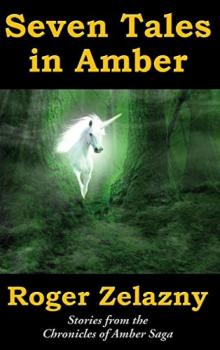 Seven Tales in Amber
Seven Tales in Amber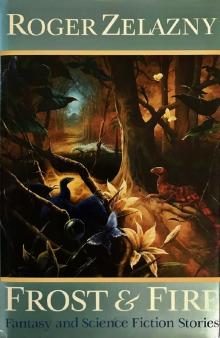 Frost and Fire
Frost and Fire Doorways in the Sand
Doorways in the Sand Unicorn Variation
Unicorn Variation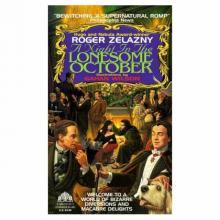 A Night in the Lonesome October
A Night in the Lonesome October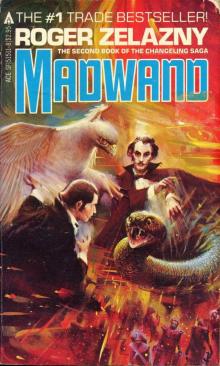 Madwand
Madwand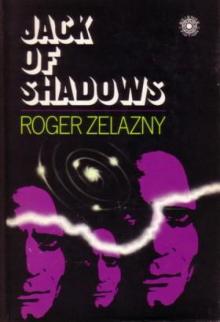 Jack Of Shadows
Jack Of Shadows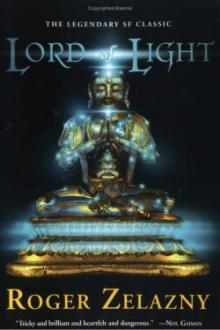 Lord of Light
Lord of Light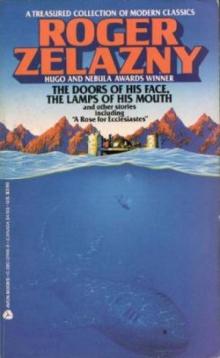 The Doors of His Face, The Lamps of His Mouth and Other Stories
The Doors of His Face, The Lamps of His Mouth and Other Stories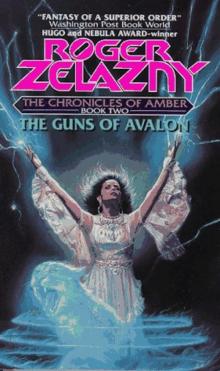 Guns Of Avalon tcoa-2
Guns Of Avalon tcoa-2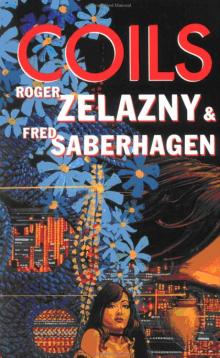 Coils
Coils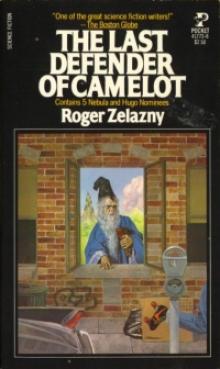 The Last Defender Of Camelot
The Last Defender Of Camelot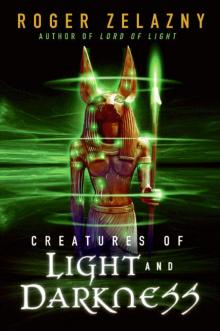 Creatures of Light and Darkness
Creatures of Light and Darkness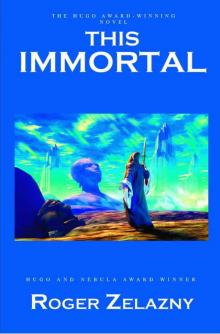 This Immortal
This Immortal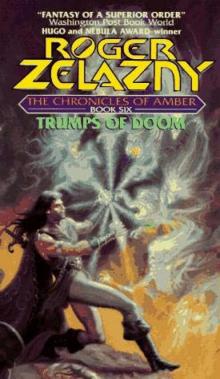 Trumps of doom tcoa-6
Trumps of doom tcoa-6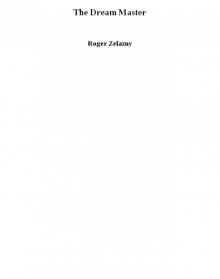 The Dream Master
The Dream Master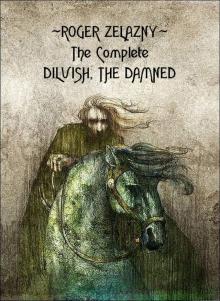 The Complete Dilvish, The Damned
The Complete Dilvish, The Damned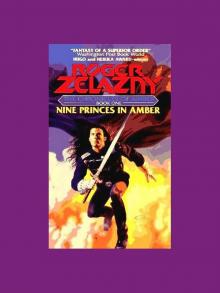 Nine Princes in Amber
Nine Princes in Amber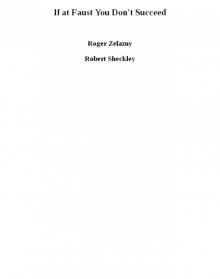 If at Faust You Don't Succeed
If at Faust You Don't Succeed Here there be dragons
Here there be dragons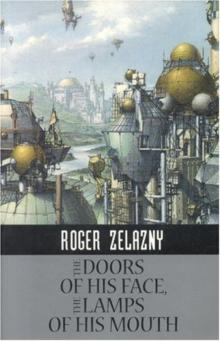 The Doors Of His Face, The Lamps Of His Mouth
The Doors Of His Face, The Lamps Of His Mouth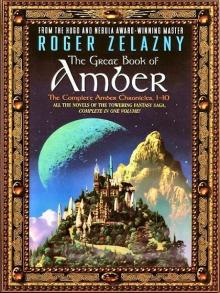 The Great Book of Amber - Chronicles 1-10
The Great Book of Amber - Chronicles 1-10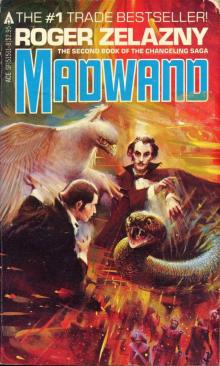 Madwand (Illustrated)
Madwand (Illustrated)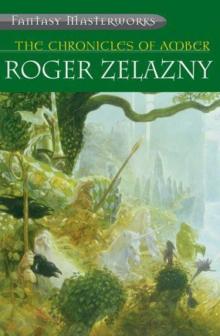 The Chronicles of Amber
The Chronicles of Amber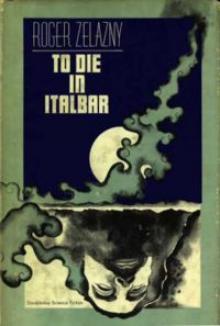 To Die In Italbar
To Die In Italbar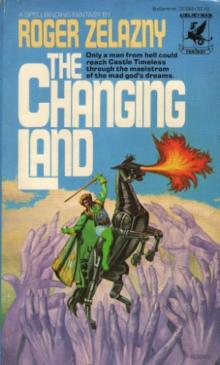 The Changing Land
The Changing Land The Furies
The Furies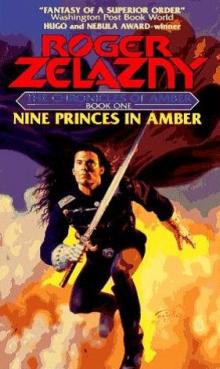 Nine Princes In Amber tcoa-1
Nine Princes In Amber tcoa-1 Last Of The Wild Ones
Last Of The Wild Ones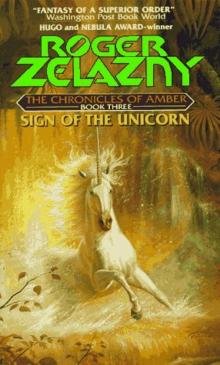 Sign of the Unicorn tcoa-3
Sign of the Unicorn tcoa-3 My Name is Legion
My Name is Legion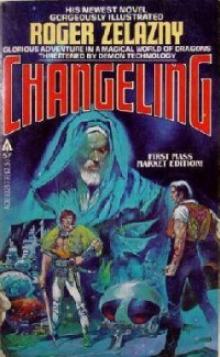 Wizard World 1: Changeling
Wizard World 1: Changeling Changeling
Changeling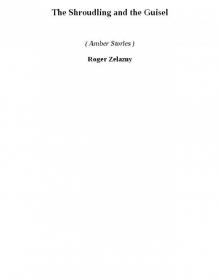 The Shroudling and the Guisel (amber stories)
The Shroudling and the Guisel (amber stories)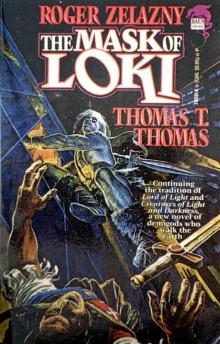 The Mask of Loki
The Mask of Loki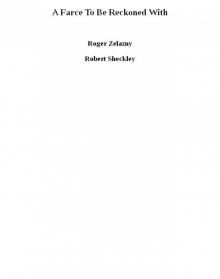 A Farce To Be Reckoned With
A Farce To Be Reckoned With Roadmarks
Roadmarks When Pussywillows Last in the Catyard Bloomed (rtf)
When Pussywillows Last in the Catyard Bloomed (rtf)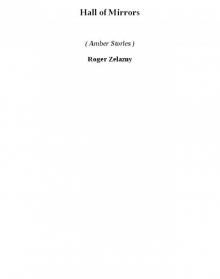 Hall of Mirrors (amber stories)
Hall of Mirrors (amber stories)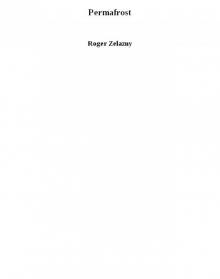 Permafrost
Permafrost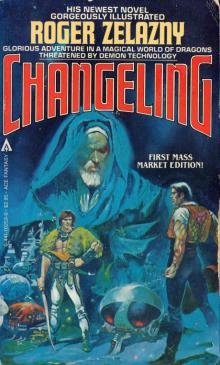 Changeling (Illustrated)
Changeling (Illustrated)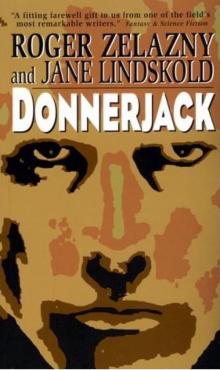 Donnerjack
Donnerjack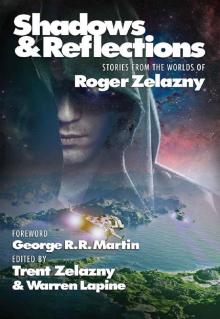 Shadows & Reflections: A Roger Zelazny Tribute Anthology
Shadows & Reflections: A Roger Zelazny Tribute Anthology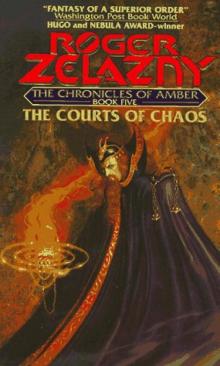 The Courts Of Chaos tcoa-5
The Courts Of Chaos tcoa-5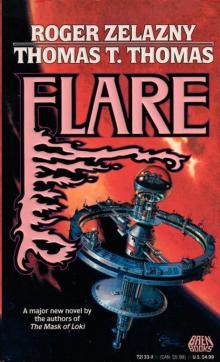 Flare
Flare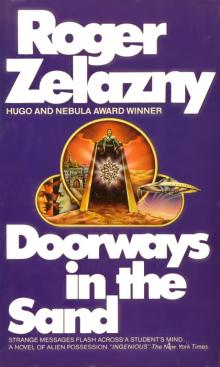 Doorsways in the Sand
Doorsways in the Sand The Great Book of Amber
The Great Book of Amber Home Is the Hangman
Home Is the Hangman For a Breath I Tarry
For a Breath I Tarry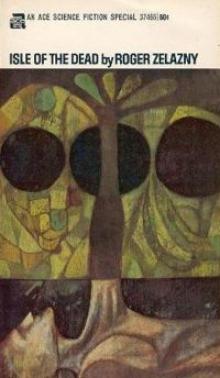 Isle Of The Dead
Isle Of The Dead Salesman Tale (amber stories)
Salesman Tale (amber stories) Dismal Light
Dismal Light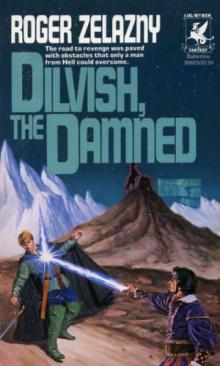 Dilvish, The Damned
Dilvish, The Damned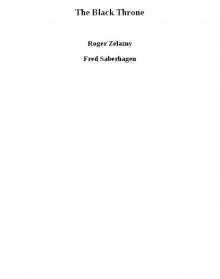 The Black Throne
The Black Throne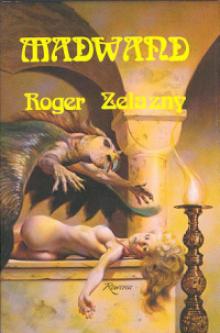 Wizard World 2: Madwand
Wizard World 2: Madwand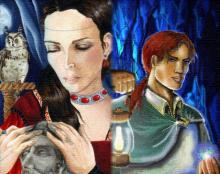 The Salesman's Tale
The Salesman's Tale